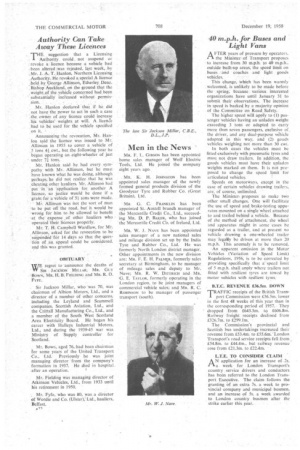40 m.p.h. for Buses and Light Vans
Page 34

If you've noticed an error in this article please click here to report it so we can fix it.
AFTER years of pressure by operators, the Minister. of Transport proposes to increase from 30 m.p.h. to 40 m.p.h., outside built-up areas, the speed limit on buses and coaches and light goods vehicles.
This change, which has been warmly welcomed, is unlikely to be made before the spring, because various interested organizations have until January 31 to submit their observations. The increase in speed is backed by a majority opinion of the Committee on Road Safety.
The higher speed will apply to (1) passenger vehicles having an unladen weight exceeding 3 tons or adapted to carry more than seven passengers, exclusive of, the driver, and any dual-purpose vehicle adapted in this way, and (2) goods vehicles weighing not more than 30 cwt.
In both cases the vehicles must be fitted exclusively with pneumatic tyres and must not draw trailers. In addition, the goods vehicles must have their unladen weights marked on them. It is not proposed to change the speed limit for articulated vehicles.
Speeds on motorways, except in the case of certain vehicles drawing trailers, are of course, unlimited.
The Minister, proposes to make two other small changes. One will facilitate the use of speed and brake-testing apparatus mounted on a single wheelattached to and trailed behind a vehicle. Because of the method of attachment, the wheel and apparatus might in some .cases he regarded as a trailer, and at present no vehicle drawing a one-wheeled trailer may legaliy be driven at more than 20 m.p.h. This anomaly is to be removed.
An apparent omission in the Motor Vehicles (Variation of Speed Limit) Regulations, 1956, is to be corrected by providing specifically that a—speed limit of 5 m.p.h. shall apply where trailers not fitted with resilient tyres are towed by motor vehicles with resilient tyres.
B.T.C. REVENUE 136.5m. DOWN
TRAFFIC receipts of the British Trans port Commission were 136.5m. lower in the first 48 weeks of this year than in the corresponding period of 1957. • They dropped from 1643.3m. to 1606.8m. Railway freight receipts declined from 1326.7m. to £259.1m.
The Commission's provincial and Scottish bus undertakings increased their revenue from 453.4m. to £55.6m. London Transport's road service receipts fell from 154.8m. to 144.4m., but railway revenue rose from 1.21.3m. to 122,4m.
L.T.E. TO CONSIDER CLAIM
AN application for an increase of. 2s. a week for London Transport's country service drivers and conductors has been referred to the London Transport Executive. The claim follows the granting of an extra 7s, a week to provincial company and municipal busmen. and an increase of 5s. a week awarded . to London country -busmen after the strike earlier this—year.




































































































